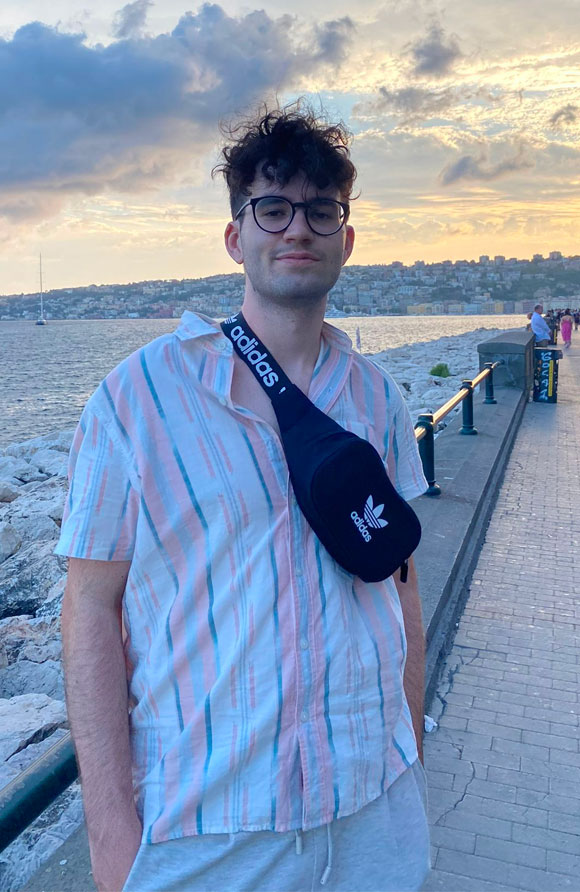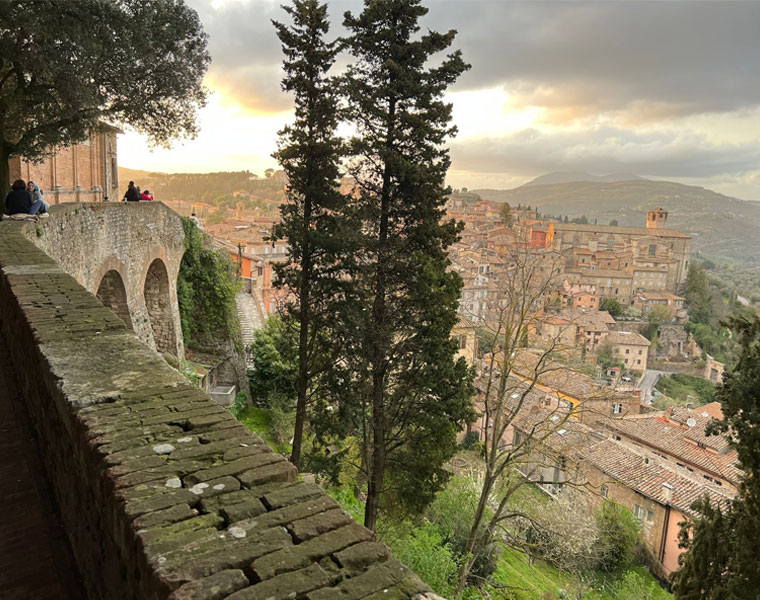Students from all around the world choose to study at Case Western Reserve University, making the institution a vibrant hub of cultural exchange and global learning. Whether they’re sharing stories of the captivating rhythms of Ghana, the bustling markets of Nigeria, the artistic heritage of Italy, the modern marvels of Dubai, the ancient civilizations of Iran or some other place, each student offers a unique perspective shaped by their homeland’s history, traditions, and landscapes.
Their stories paint a vivid picture of the world beyond our campus—fostering an environment of mutual understanding and appreciation right here in Cleveland. Today (May 7) is National Tourism Day, which was established in 1983 by President Ronald Reagan to encourage and celebrate the benefits of travel. To mark the occasion, The Daily is putting the spotlight on five undergraduate and graduate students’ homelands from around the globe.
Read on to learn a few tips and tricks the students shared for navigating their home countries.
Federico Tanci

Home country: Italy
Master of Supply Chain Management student
Q: What’s your favorite part about Italy?
Tanci: Most Italians remain in their hometown for their entire lives. This creates a strong bond and a profound sense of identity between the city and its residents. This connection is evident even to tourists, who, when visiting any Italian city, especially the smaller ones, will witness firsthand how cities are brimming with traditions passed down from generation to generation. One example is the traditional town festivals held in historic centers, where many local volunteers organize fantastic events that blend delicious local food with traditional music. Ultimately, it’s the strong sense of belonging and love for one’s hometown that makes Italian cities very warm and welcoming.
Q: What is the best piece of advice you have for people who visit?
Tanci: Italy is a country with a millennia-old history, a cradle of great civilizations, and the effects of this history, sometimes unfortunately tumultuous, are still evident today in Italian culture. Monuments serve as the physical representation of this history. While many of them are aesthetically beautiful, such as the famous “Vittoriano” in Rome, one can truly appreciate these works only by understanding their history and the significance they still carry today. That is why I suggest to tourists not so much to rely on tour guides but to delve into the history of the monuments they want to visit themselves, so they can be immediately fascinated when they finally stand in front of that particular monument they researched about.
Q: What’s one unique thing people should do or see when visiting?
Tanci: During their stay, I suggest tourists explore even the smaller and less famous cities because they have the potential to be unexpected gems. I am from a beautiful small city in central Italy called Perugia. I can assure you that my fellow citizens, like all Italians in general, take pride in their hometown and are therefore delighted to provide valuable advice and guide tourists in discovering their birthplace. For example, you could step into a local artisan’s shop, where they will proudly showcase their merchandise and undoubtedly share many anecdotes and insights about the city. Italians love to do this! This way, you’ll have the opportunity to connect with the less touristy Italy and live unique and authentic experiences.
Q: What’s something people should avoid when visiting?
Tanci: Unfortunately, the large and touristy historic centers of Italian cities are often filled with scam restaurants that offer mediocre or low-quality products at exorbitant and unjustified prices. These restaurants frequently serve dishes claimed to be “traditional” but that are actually very far from it. Additionally, it’s crucial to be very cautious of individuals posing as tour guides who are not licensed and are only looking to scam you out of money. Lastly, never purchase products from street vendors, as their goods are often counterfeit. An example of this is the vendors selling water bottles in front of the Colosseum in Rome. These water bottles are not sealed but have been previously opened, consumed, and refilled with water.
Abisola Folorunso

Home country: Nigeria
PhD in Biology student
Q: What’s your favorite part about Nigeria?
Folorunso: What fascinates me the most about Nigeria is its diverse and lively cultural environment. The country’s rich diversity of languages, traditions, cuisine (particularly the iconic Jollof Rice), and music creates a dynamic and colorful atmosphere that is both inspiring and captivating. Exploring Nigeria allows one to encounter diverse experiences, from the bustling streets of Lagos to the serene landscapes of the countryside, each offering a unique glimpse into the nation’s soul. Moreover, Nigeria’s warmth and resilience shine through its people, who embody a spirit of unity and perseverance in the face of challenges. This cultural richness is what makes Nigeria a truly fascinating and unforgettable place to be.
Q: What is the best piece of advice you have for people who visit?
Folorunso: My advice would be to embrace the diversity and immerse yourself in the rich cultural experiences the country has to offer. Explore the bustling cities, savor the delicious cuisine, groove to the vibrant music, and interact with the friendly locals. Also, be open-minded and respectful of the different traditions and customs you encounter along the way. Nigeria is a fascinating country with a lot to offer, so make the most of your time there by embracing all it has to offer.
Q: What’s one unique thing people should do or see when visiting?
Folorunso: One unique experience you shouldn’t miss when visiting Nigeria is exploring Nigeria’s natural wonders, such as the Ikogosi Warm Spring in Ekiti State, Yankari Game Reserve in Bauchi State, Olumo Rock in Ogun State, Gurara Waterfalls in Niger State, Idanre Hills in Ondo State, and lots more. These places all hold cultural and historical significance, and they offer breathtaking views and provide a chance to connect with the country’s stunning landscapes.
Q: What’s something people should avoid when visiting?
Folorunso: When visiting Nigeria, it is advisable to avoid traveling alone at night, especially in unfamiliar or dark and shady areas. Staying informed about local customs and safety guidelines can help ensure a smooth and enjoyable visit to Nigeria.
Nivedita Srinivasan

Home country: United Arab Emirates (Dubai)
Biology undergraduate student
Q: What’s your favorite part about Dubai?
Srinivasan: My favorite part about Dubai is that there is something for all to enjoy, no matter young or old. Whether it is delicious cuisines, or a quiet sit down candlelight dinner or a fun theme park, it’s all there!
Q: What is the best piece of advice you have for people who visit?
Srinivasan: The best piece of advice I have for people who visit Dubai is to definitely stay for at least a week, and not just a usual airport layover like many do. Doing this will help you explore both the historical and futuristic side of Dubai and the United Arab Emirates as a whole.
Q: What’s one unique thing people should do or see when visiting?
Srinivasan: One unique thing to see in Dubai is the desert night life by going on a desert safari and camping out under the dark sky on the cold sand. Also, seeing and touching camels, falcons and Arabian Oryx while experiencing traditional belly dancers and authentic food.
Q: What’s something people should avoid when visiting?
Srinivasan: Something people should avoid while visiting is going to the top of Burj Khalifa. Yes, it is the tallest skyscraper in the world but it can be admired as beautifully on the outside as by going to the top. This saves so much money which can be used elsewhere for other fun experiences and events. Avoid visiting Dubai during the summers if you’re someone not used to the dry heat and humidity. It can get really crazy and unbearable at times and makes it unlikely for you to roam around anywhere without air conditioning.
Nima Firouzi

Home country: Iran
PhD in Chemical Engineering student
Q: What’s your favorite part about your home country?
Firouzi: I called the Azerbaijan area of Iran my home, a vibrant urban hub teeming with over 7 million inhabitants. This region is distinguished by its dramatic mountainous landscapes, offering enchanting hiking routes that wind through lush greenery. Among these natural wonders, the Sahand Mountain Range reigns supreme, its majestic peaks drawing both locals and tourists alike. For us, it was a cherished tradition to set up camp in the Sahand during the balmy summer months (90 days), immersing ourselves in the tranquility of nature’s embrace. My photo (above) is a glimpse of the breathtaking Sahand Mountain Chain, a testament to the awe-inspiring beauty of this region.
Q: What is the best piece of advice you have for people who visit?
Firouzi: Azerbaijan has much more to offer than just scenic vistas. Its rich culinary heritage beckons travelers to indulge in the flavors of the land. From the hearty warmth of “Ashee Dough” to the savory delights of “Kofte Tabrizi,” each bite tells a story of tradition and culture. And while savoring these culinary delights, don’t miss out on exploring the tourist attractions that dot the landscape. “El Guli” and “Eynali” stand as testaments to Azerbaijan’s storied past and vibrant present, inviting visitors to uncover their secrets.
Q: What’s one unique thing people should do or see when visiting?
Firouzi: Amidst the hustle and bustle of modern life, Azerbaijan still harbors ancient wonders waiting to be discovered. “Kandovan” is one such marvel, a village where time seems to stand still amidst its cliffside dwellings. Carved into the rock by the forces of nature, these homes have stood the test of time, offering a glimpse into a bygone era.
Q: What’s something people should avoid when visiting?
Firouzi: It’s important to plan your visit wisely, especially considering Azerbaijan’s harsh winters. The biting cold can be unforgiving, so it’s best to explore this enchanting region during the milder seasons, when the landscape bursts to life with color and vitality.
Sarah Acquam

Home country: Ghana
Master of Social Work student
Q: What’s your favorite part about Ghana?
Acquam: As a proud Ghanaian, there are so many things I love about my home country, but if I had to choose a favorite, it would have to be the incredible food, welcoming community, and hospitable people. The food in Ghana is simply unbeatable, with our famous jollof rice being a must-try dish for any visitor. But beyond the delicious cuisine, it’s the warm and inviting spirit of the Ghanaian people that really makes the country special. Many visitors I know have told me they felt right at home during their time in Ghana, which is why we greet everyone with the word “Akwaaba,” meaning “welcome” in our local language. We take great pride in our heritage and are always eager to share it with visitors.
Q: What is the best piece of advice you have for people who visit?
Acquam: If you really want to experience the true essence of Ghana, I would highly recommend visiting during December. This is when Ghana comes alive with festivities, cultural events, live band music, and a lively atmosphere that truly showcases the heart and soul of our country. You will have the chance to immerse yourself in our rich cultural traditions. Beyond that, my top piece of advice would be to come with an open mind. Don’t get frustrated if things take longer than expected; just go with the rhythm of “Ghanaian Time.” This relaxed mentality is all part of the charm, and you’ll be sure to have an unforgettable experience.
Q: What’s one unique thing visitors should do or see in Ghana?
Acquam: One unique experience I would urge any visitor to Ghana to partake in is exploring our stunning natural landscapes. From the beautiful beaches that line the coast to the lush rainforests and towering waterfalls inland, Ghana is home to some of the most breathtaking scenery in Africa. Be sure to visit iconic sites like the Cape Coast and Elmina Castles, which offer a sobering look into Ghana’s history. And for the adventurous, don’t miss the chance to take a canopy walk through the treetops of Kakum National Park. You should also make time to visit the vibrant cultural art centers, where you can witness traditional craftsmanship and purchase unique souvenirs.
Q: What’s something visitors should avoid when visiting Ghana?
Acquam: While Ghana is an incredibly welcoming and hospitable country, there are a few cultural norms that visitors should be mindful of. You will have to be cautious about how you greet people—never use your left hand, as it is considered disrespectful. And, of course, always be respectful of local customs and traditions to avoid any cultural missteps. Also, avoid packing heavy winter clothing as our climate is generally warm and tropical.





